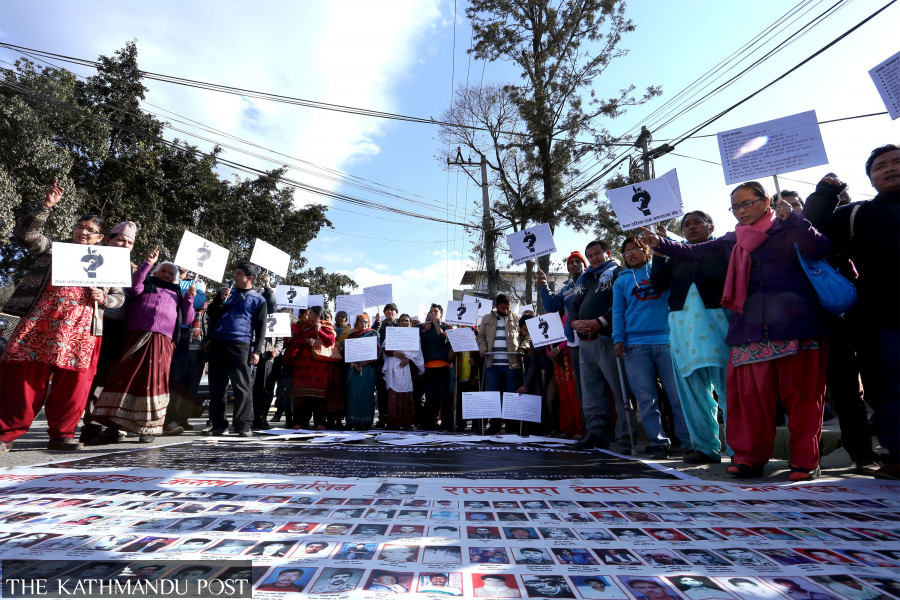National
High courts intervene after police refuse to register conflict-era disappearance complaints
The Penal Code introduced three years ago lists enforced disappearance as a criminal offence.
Binod Ghimire
The families of the victims of enforced disappearances are turning to the regular justice system following the failure of the transitional justice mechanism to make any significant progress in investigating the conflict-era cases.
From August, the kin of those who were forcibly disappeared either by the state security forces or the then Maoist rebels during the decade-long insurgency started filing first information reports (FIR) with the police. The families of 14 disappeared persons from eight districts attempted to register complaints against the alleged abductors at the respective district police and district attorney offices.
After the police and district attorneys refused to entertain even a single complaint saying they do not fall under their jurisdiction because the transitional justice commissions were looking into the cases, two high courts have intervened in the matter.
Responding to the petitions from the victims, Biratnagar High Court and the Baglung bench of Pokhara High Court have directed the district police offices in Morang and Baglung as well as the attorney offices of the two districts to furnish written clarifications within 15 days for their refusal to register the complaints.
One of the victims had first tried to register a complaint with police but as they refused, the victim turned to the district attorney. However, there was no progress.
“It is their responsibility to accept the complaints and start investigation. We had to knock at the court’s door following their refusal,” said Bimal KC from Baglung whose son Ganesh was arrested by the then Royal Nepal Army in November, 2001. “The court’s ruling has given us some hope.”
KC said they had to opt for the regular criminal justice system as he had no hope that the Commission of Investigation on Enforced Disappeared Persons would reveal the whereabouts of his son.
Ganesh KC was just thirteen when he joined the Maoist rebellion. In 2001, the teenager had returned home for a vacation from New Delhi, India when a ‘cultural team’ of the CPN (Maoist) wooed him into joining them. Being of an impressionable age, Ganesh agreed to join the Maoists and left his home at Jaimini, Baglung.
He was arrested when he and his fellow comrades encountered an army patrol but he was never released. Two decades have passed and Bimal's fight for justice hasn’t stopped.
The lawyers supporting the victims say they moved the court based on the provisions of the Penal Code that came into effect three years ago. The code, for the first time, has criminalised enforced disappearance.
Section 206 (1) of the Penal Code prohibits enforced disappearance and lists it as a criminal offense. Anyone convicted of a criminal act could face 15 years of jail and Rs 500,000 fine or both, as per the code. If the victim of the enforced disappearance is a child or a woman, the jail sentence can be increased to 17 years.
A team of Nepal Army soldiers took Dhak Bahadur KC, from Galkot Municipality -2, Baglung under control on March 15, 2002 for his alleged support to the Maoist party. However, the army never made his status public. His wife Chham Kumari registered a complaint at the disappearance commission. As the commission did little to investigate her husband’s status, she is seeking recourse from the regular justice system.
“The police have to register FIR and start investigation based on the penal code and a Supreme Court ruling,” Ram Sharma, who fought for Chham Kumari, told the Post. “There is no doubt that the court will issue a ruling to this effect although we still doubt that the police will investigate the matter.”
The Supreme Court in its ruling on a writ petition filed by advocate Madhav Kumar Basnet has said that the act of disappearance is a gross human rights violation and the alleged perpetrator(s) needs to be prosecuted under the criminal law.
In the last six years the commission has received 3,223 complaints of enforced disappearances perpetrated both by the security forces and the Maoists. After looking into the complaints, the commission has identified 2,494 cases as genuine.
The latest report by the International Committee of the Red Cross, however, says 1,333 people are still missing in connection with the armed conflict.




 13.12°C Kathmandu
13.12°C Kathmandu














